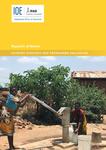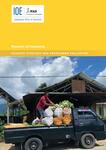Page Header

Downloads:
1
United Mexican States Country Strategy and Programme Evaluation
Overview
This is the second country strategy and programme evaluation carried out in the United Mexican States by the Independent Office of Evaluation of IFAD. It covers the partnership between the Government and IFAD from 2007 to 2018. During this period, IFAD has invested in seven projects and programmes in the country with a total cost of US$250.56 million, of which US$132.95 million was financed by IFAD. The programme focused on supporting groups of rural producers living in poverty who had not previously been reached by public programmes. In addition, Mexico is highly vulnerable to the effects of climate change and these projects showed that it is possible to achieve a balance between local economic needs and positive environmental impact. However, the performance of the portfolio was weakened by changes in agricultural sector policies, to which ongoing projects were not adapted, as well as design weaknesses such as a lack of innovative approaches to training producers and their organizations in financial services and market access. The grants programme opened up opportunities for consultation on rural policy issues and options, by supporting rural dialogue groups and multinational studies on conditional cash transfer programmes and ways to combine them with inclusive production measures. The evaluation sets forth the following main recommendations: (i) fine-tune the country programme’s geographical and agro-ecological targeting; (ii) improve the technical and innovative quality of project design; (iii) improve monitoring of and capitalization on lessons learned; (iv) strengthen IFAD’s capacity to provide operational and strategic support for the programme; and (v) promote greater government engagement in project design and implementation, as well as adequate budgetary allocation for implementation.Report Details
| Year Published | |
| Type | |
| Joint | No |
| Partner/s | N/A |
| Consultant name | Jorge García García - José Peres Arenas - Graciela Reyes Retana - Federica Lomiri |
| Agency Focal Point | Fabrizio Felloni |
| Focal Point Email | evaluation@ifad.org |
| Managed by Independent Evaluation Office | Yes |
| Country/ies |
YOU 'RE READING
United Mexican States Country Strategy and Programme Evaluation










